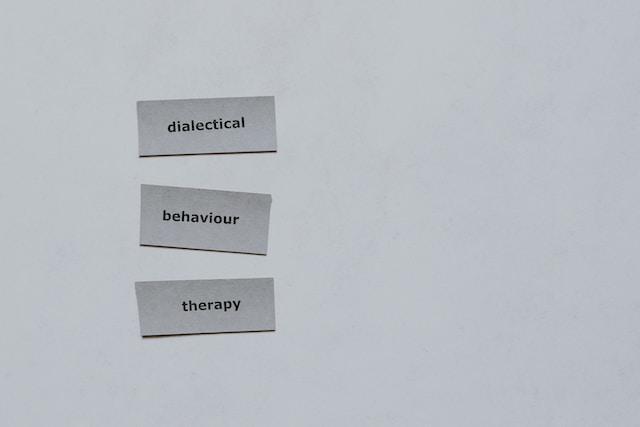Changing Lives: DBT London's Holistic Technique to Recovery
Wiki Article
Equipping People With Reliable Dialectical Behaviour Therapy (DBT) Services: Building Stronger Mental Health Foundations
In the realm of psychological wellness and well-being, the significance of equipping people via effective Dialectical Behavior Therapy (DBT) services can not be overemphasized. By focusing on the core principles of DBT, such as improving psychological regulation skills, boosting social effectiveness, building distress tolerance strategies, and cultivating mindfulness techniques, people can embark on a journey in the direction of building more powerful psychological health structures. The influence of DBT surpasses mere symptom monitoring; it offers an alternative technique that outfits individuals with the tools required to navigate life's obstacles with resilience and self-awareness. As we explore the transformative potential of DBT in encouraging people to lead more meeting lives, the course to boosted mental health and wellness and well-being comes to be a compelling story that beckons exploration.Comprehending the Core Principles of DBT
DBT integrates basic cognitive-behavioral techniques with concepts of distress mindfulness, acceptance, and resistance. The key objective of DBT is to help people build a life worth living by stabilizing change with acceptance.
One core principle of DBT is recognition. One more fundamental aspect is dialectics, which instructs people to see circumstances from several perspectives and locate the synthesis between contradictory ideas or feelings.
Furthermore, the idea of dialectical abstinence is central to DBT. This concept urges individuals to abstain from suicidal actions while likewise approving themselves. By understanding and including these core principles, therapists can effectively carry out DBT strategies and support individuals in their journey in the direction of psychological policy and psychological well-being.
Enhancing Emotional Guideline Abilities
Establishing proficiency in managing feelings is an essential aspect of promoting mental well-being and interpersonal efficiency. Enhancing psychological regulation skills is a core element of Dialectical Behaviour Treatment (DBT) that furnishes individuals with the devices to navigate extreme emotions in a constructive and healthy and balanced way. Through DBT, people find out to determine, comprehend, and control their feelings, causing improved psychological health results.DBT highlights the importance of mindfulness, which involves existing in the moment without judgment. This method allows people to observe their emotions without ending up being bewildered by them, boosting their ability to respond efficiently as opposed to react impulsively. By growing mindfulness, people can create a greater sense of self-awareness and psychological control.

Improving Interpersonal Efficiency
Having established a strong foundation in emotional policy skills within the structure of Dialectical Behavior Therapy (DBT), the emphasis now changes in the direction of enhancing interpersonal effectiveness. Improving interpersonal performance is an important part of DBT as it furnishes people with the needed abilities to browse social interactions, interact efficiently, established boundaries, and develop healthier relationships.In DBT, social effectiveness skills are taught via informative post components that focus on areas such as assertiveness, effective interaction, and interpersonal analytic - DBT London. By finding out these skills, individuals can enhance their capability to share their demands and needs, maintain self-esteem, and build stronger links with others


Structure Distress Resistance Strategies
Checking out efficient methods for handling emotional distress is essential for individuals seeking to boost their coping abilities and resilience. Structure distress tolerance strategies is a vital aspect of Dialectical Behaviour Therapy (DBT) that equips people to browse challenging emotions without becoming overloaded.Moreover, mindfulness methods play a considerable role in structure distress tolerance. Mindfulness encourages individuals to remain present in the moment without judgment, enabling them to observe their thoughts and emotions without reacting impulsively. This recognition allows reference people to tolerate distress more properly and develop a better sense of control over their reactions.
Along with these strategies, creating an individualized distress resistance plan with the assistance of a qualified specialist can provide individuals with a tailored method to handling emotional distress. By including these techniques right into day-to-day live, people can strengthen their psychological wellness structures and enhance their general health.
Cultivating Mindfulness Practices
To grow their distress resistance strategies even more, individuals can focus on cultivating mindfulness techniques as a complementary approach within the framework of Dialectical Practices Treatment (DBT) Mindfulness, a crucial component of DBT, includes focusing on today moment without judgment. DBT London. By fostering mindfulness, individuals can enhance their recognition of thoughts, feelings, and bodily feelings, promoting a much deeper understanding of themselves and their experiencesMindfulness methods in DBT include methods such as mindful breathing, body scans, and observing ideas without attachment. These techniques encourage individuals to create a non-reactive position towards their internal experiences, permitting them to react to difficult situations with better clarity and calmness. By including mindfulness right into day-to-day routines, individuals can find out to regulate their feelings extra effectively, minimize impulsive actions, and cultivate a feeling of internal peace.
Via growing mindfulness techniques, individuals undertaking DBT can build a solid structure for managing stress and anxiety, enhancing connections, and improving general wellness. By incorporating mindfulness right into their therapeutic journey, individuals can create beneficial abilities that encourage them to browse life's obstacles with durability and self-awareness.
Conclusion
To conclude, effective Dialectical Behavior Therapy (DBT) solutions play a crucial function in empowering individuals to develop stronger psychological health structures. By comprehending the core concepts of DBT, improving emotional policy abilities, improving interpersonal efficiency, developing distress tolerance methods, and growing mindfulness practices, people are furnished with the necessary tools to navigate their why not try here emotions, connections, and challenges in a more flexible and durable manner. DBT solutions provide a thorough method to advertising mental well-being and equipping people to lead fulfilling lives.By focusing on the core principles of DBT, such as improving psychological regulation skills, boosting social performance, building distress resistance methods, and cultivating mindfulness methods, individuals can begin on a trip in the direction of structure stronger psychological health structures. Enhancing psychological regulation skills is a core element of Dialectical Behavior Treatment (DBT) that furnishes people with the devices to navigate intense feelings in a useful and healthy way.Furthermore, DBT shows useful abilities such as distress tolerance and emotion law strategies to help individuals take care of difficult emotions.To strengthen their distress resistance techniques further, people can focus on cultivating mindfulness techniques as a complementary method within the structure of Dialectical Practices Therapy (DBT) By recognizing the core principles of DBT, enhancing emotional regulation abilities, boosting interpersonal efficiency, developing distress tolerance strategies, and growing mindfulness practices, people are geared up with the essential tools to browse their emotions, partnerships, and difficulties in an extra resistant and adaptive way.
Report this wiki page